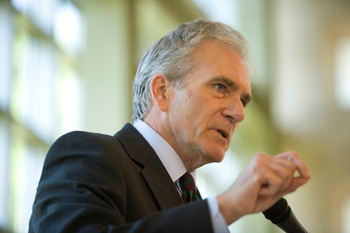By Jeff Brumley
The voices from the right, condemning Islam and fearing Muslims, have gotten noticeably louder in recent days.
On Monday, Republican presidential candidate Donald Trump issued a call to ban all Muslims from entering the United States. On Friday, Liberty University President Jerry Falwell Jr. encouraged students to carry concealed weapons on campus to “end those Muslims before they walk in.”
Their controversial proposals followed last week’s mass killing in San Bernardino, Calif., where two ISIS sympathizers gunned down 14 people at a holiday party.
So fear, it seems, is ruling the day.
But it doesn’t have to, said Joe Phelps, pastor of Highland Baptist Church in Louisville, Ky.

“This is a great time to be a Christian because there is a real important debate happening — not inside the churches but out in the public square — about what it means to be a Christian and what it means to be an American,” Phelps said.
So far, doubt and suspicion have won out.
“We have allowed people’s fear to define the answer,” he said. “And that’s what Donald Trump does — he plays on people’s fears.”
But there are other voices.
On Tuesday, Brent Walker, executive director of the Baptist Joint Committee for Religious Liberty, issued a statement condemning Trump’s latest idea.
“Donald Trump’s proposal to ban Muslims from entering the U.S. is un-American, unworkable, counterproductive and embarrassing,” Walker said. “It’s no more than disgusting demagoguery — exploiting popular fear and fanning pervasive anti-Muslim bigotry for political gain.”

Others, ranging from South Carolina Republican Senator Lindsay Graham to President Molly Marshall at Central Baptist Theological Seminary, came out in opposition.
And so did Russell Moore, who slammed Trump’s idea in a Thursday opinion piece published in the Washington Post.
“Anyone who cares an iota about religious liberty should denounce this reckless, demagogic rhetoric,” wrote Moore, president of the Southern Baptist Convention’s Ethics and Religious Liberty Commission.

Christians, Moore said, must stand up not only for their own religious freedoms but those of anyone being threatened.
“A government that can shut down mosques simply because they are mosques can shut down Bible studies because they are Bible studies,” he said in the Washington Post piece. “A government that can close the borders to all Muslims simply on the basis of their religious belief can do the same thing for evangelical Christians.”
‘Not enough to sit at home’
Others are following suit by speaking up locally through interfaith relationships and events, or by penning blogs and columns.
In a Tuesday column for Baptist News Global, Dallas-based theologian and activist Jeff Hood said Trump presents a threat to religious and political freedom that Christians must take seriously.
“This is real. People are being hurt and slandered,” Hood said.

The gospel compels radical opposition to Trump’s radically anti-gospel movement, he added.
“Jesus says that what you have said to the Muslim, what you have done to the Muslim — and what you have not done and said — you have done to me,” Hood said.
It means that Christians can no longer worship comfortably in their churches while Trump and others seek to harm people based on religious beliefs.
“We are at a moment where persons of faith are called to stand up,” he said. “It’s not enough to sit at home and watch all this stuff play out like a sitcom or theater.”
‘We have a responsibility’
One way to get out of the home and church to make a dent in the machinery of fear is to get involved in interfaith work, said Mitch Randall, pastor at NorthHaven Church in Norman, Okla.
Randall and his congregation have been major supporters and participants in building a cohesive interfaith community in the region. Established in response to the 9-11 terror attacks, that network has helped minimize anti-Muslim public reactions to other terror events.
“These are no longer just some unknown Muslims,” Randall said about Muslims in Oklahoma. “They are people that we have relationships with, people we have broken bread with.”
Interfaith dialogue contributes to minimizing the severity of reactions to comments like Trump’s and Falwell’s, he said.

“When politicians try to paint with broad strokes, it just doesn’t fly.”
Public stances against Trump and Falwell, by leaders like Moore and Walker, are also important, Randall said.
“We have a responsibility to call the public’s attention to these remarks and denounce them for what they are — un-American,” he said.
‘Being shouted down and called names’
It’s also a very uncomfortable environment for Muslims — especially in Texas.
National Public Radio reported Tuesday that hate crimes and harassment of Muslims have nearly reached post 9-11 levels in the Lone Star state.
The story described protesters, many of them carrying loaded rifles and shotguns, demonstrating across the street from a mosque in Irving.
The KKK has announced its intention to demonstrate at the mosque.

This year has been “a banner year for hatred in the Dallas-Fort Worth metroplex, but it was centered in Irving,” Alia Salem, director of the DFW chapter of the Council on American-Islamic Relations, or CAIR, a Muslim advocacy group, told NPR.
Other Muslims are reporting confrontations elsewhere around the state.
“In the bigger [Texas] cities, there’s definitely tension,” Joe Bradford, a Muslim scholar who lives in Houston, told BNG by phone on Tuesday.
Bradford told of a Muslim woman who found a note on her car outside a Houston grocery store telling her to leave the country.
“In the smaller cities and towns we are hearing about people being shouted down and called names,” Bradford said.
There is also tension within the Muslim community in Texas as they hear the fear-based rhetoric from Trump, Falwell and others, he said.
“People are afraid if the rhetoric doesn’t cool down, a lot worse things are going to happen.”
‘Not willing to do that’
Knowing that is part of what drove Phelps to participate in a Tuesday interfaith press conference in Louisville. Its purpose was to present a unified religious voice against efforts to ban Syrian refugees.
The same kind of effort is needed to oppose the Trumps and Falwells of the world, he said.
“We can’t simply stand in our pulpits and preach to our people about this, we must become part of the national conversation.”
Failure to do so means Trump and others get to define what it means to be religious and American, Phelps said.
“And I am not willing to do that.”
